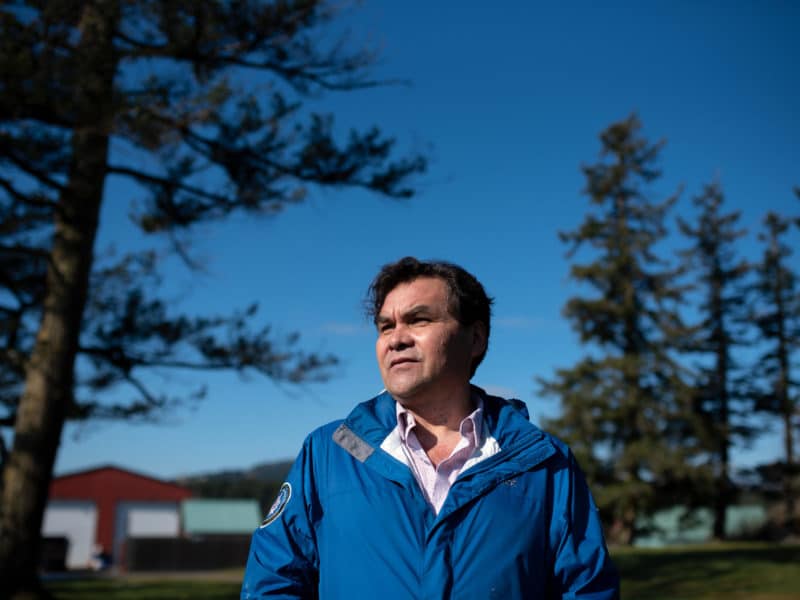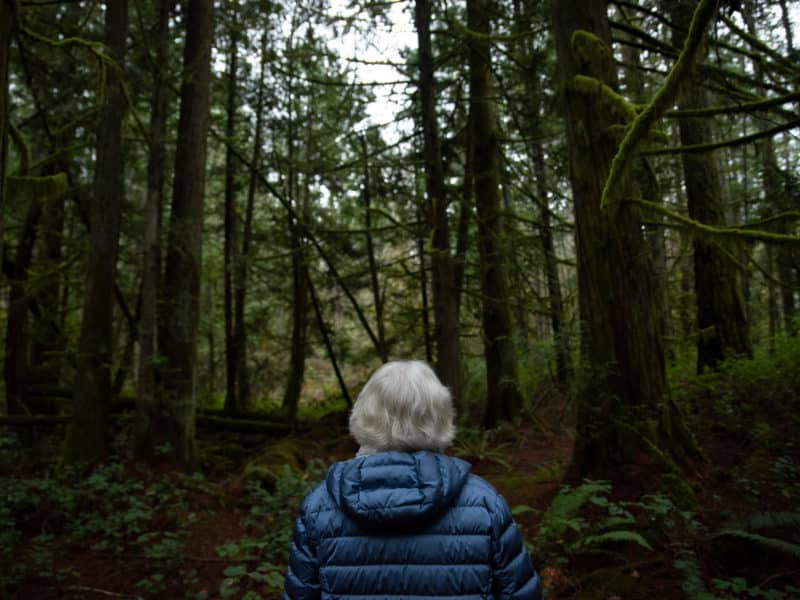
This article is the fourth part in an ongoing series about a fight over a gravel quarry in the Highlands, and its broader implications. Read the first three parts here, here and here. Sign up to get more stories like these in your inbox.
Update, June 15, 2021: On Monday, June 14, the B.C. Court of Appeal denied the Highlands District Community Association’s appeal of the dismissal of an application that asked for a judicial review of the Mines Inspector’s decision to issue a permit to O.K. Industries Ltd. to operate a rock quarry in the District of Highlands. You can read the decision here.
For years, community members in the District of Highlands have been fighting to stop a rock quarry operation at the municipality’s southern border. Located about 25 minutes away from Victoria, B.C. and adjacent to the quickly growing City of Langford, the District of Highlands is a forested refuge beyond big box stores and new developments.
Residents in the Highlands have expressed concern over impacts the rock quarry operation may have on things like drinking water, the ecology of the area and climate change. And it’s this last concern that has brought the district’s community association to court — the most recent battleground upon which this fight is taking place.
O.K. Industries Ltd. was granted a permit for the quarry operation under the provincial Mines Act in 2020. The company argues that it has taken resident concerns into consideration and even went so far as to hire a third party to complete an environmental effects and mitigation report as part of the permit application process, in response to residents’ concerns. The company says it’s strictly following the law and, so far, the courts have agreed.
But a lawyer representing the Highlands District Community Association argued in court on May 5 that the statutory decision maker — who works under the Ministry of Energy, Mines and Low Carbon Innovation — erred when he failed to consider climate change when making the decision to grant O.K. Industries a permit. If the courts agree with the argument, it would have major implications on mining legislation in B.C. If the courts rule against the association, the case could still serve as fodder for advocates who are pushing politicians to change mining legislation in the province.
The court has not yet released a decision.
The Highlands District Community Association in court
In June, 2020 the Highlands District Community Association filed an application to the B.C. Supreme Court for a judicial review of the province’s decision to grant O.K. Industries Ltd. a permit to run its rock quarry operation in the Highlands.
On Nov. 6, 2020, the B.C. Supreme Court denied the association’s request for a judicial review. Shortly after, the community association filed an appeal of the court’s decision.
After the November ruling, Highlands District Community Association chair Scott Richardson said in a news release that he was disappointed with the court’s decision to deny a judicial review. But he said he wasn’t surprised, knowing the court considered community concerns about the quarry operation through the lens of the Mines Act permitting process.
“In essence, the ruling shows there is nothing in the legislation that sufficiently recognizes the legitimate concerns of groundwater-dependent communities,” Richardson said at the time. “As it turns out, the provincial legislation blocks our community’s voice and trumps the vision and values residents hold for the community.”
Richardson said he was also disheartened to know that climate change analysis could be bypassed for this particular operation due to its size.
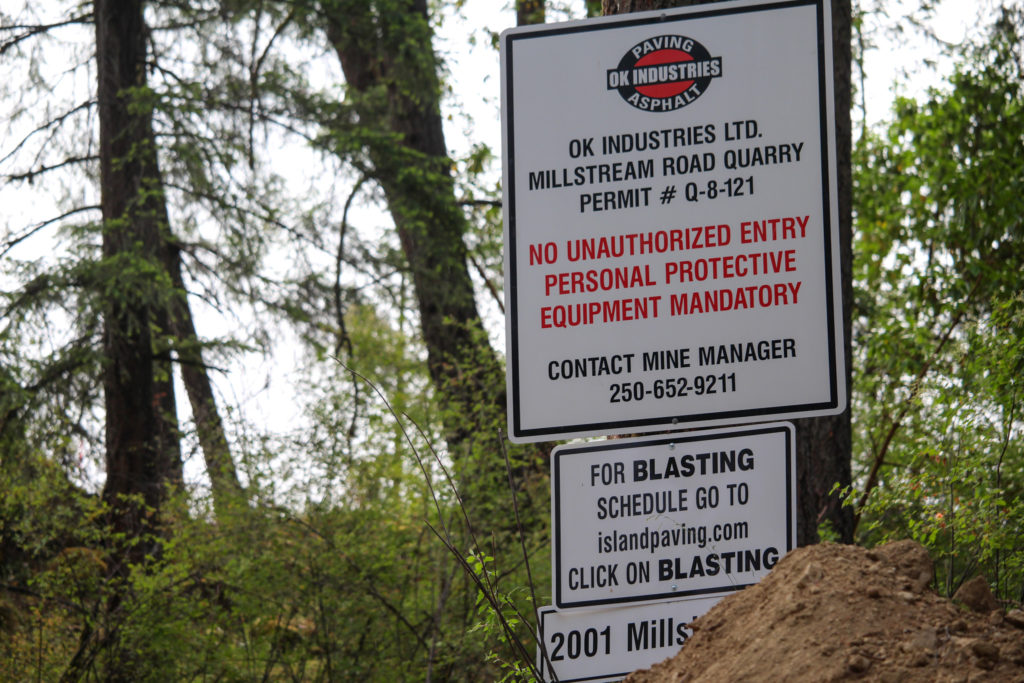
According to an email sent to The Discourse from the Ministry of Energy, Mines and and Low Carbon Innovation, major mines and expansions in B.C. require an environmental assessment certificate only if they exceed thresholds established in the Reviewable Projects Regulation under the 2018 Environmental Assessment Act. The act specifies matters that must be included in every environmental assessment, including greenhouse gas emissions, biophysical factors that support the function of an ecosystem and consistency with any land use plan.
“For every environmental assessment the Environmental Assessment Office establishes a Technical Advisory Committee that includes provincial and federal experts and regulators, Indigenous nations and experts from local governments,” the ministry says.
In the case of quarries, they only need an environmental assessment certificate if they have a production capacity of 250,000 tonnes per year or more. Smaller scale industrial mineral mines and aggregate pits or quarries are considered statutory decisions under the Mines Act. The O.K. Industries quarry is a smaller-scale operation, meaning an environmental assessment was not required.
The statutory decision maker
The ministry says permitting decisions under the Mines Act are made by independent, statutory decision makers within the ministry. The ministry says decision makers are responsible to complete a “thorough and comprehensive review and to consider all relevant information and perspectives — including feedback and comments from municipalities, First Nations, environmental organizations and the public.” Any feedback during the decision-making process is provided to the statutory decision maker to inform the decision.
“Statutory decision makers use their professional judgement to address the unique circumstances, which may include provision of special conditions to the permit, as long as they are consistent and within the scope of the guiding legislation,” the ministry says.
In a document outlining reasons for his decision, statutory decision maker Don Harrison says he heard “various concerns” from the District of Highlands, the Highlands District Community Association and the public. Those questions and concerns were shared with O.K. Industries and Harrison says the company adequately addressed them to his satisfaction.
Harrison points out that O.K. Industries hired qualified professionals to review the history of the property and surrounding area, conduct site investigations, gather data and design 33 measures and strategies to mitigate potential impacts from the quarry operation.
Groundwater and surface water have been key issues of concern, Harrison says, and he notes that the environmental effects and mitigation report assesses the risk to groundwater and nearby surface water and also provides recommendations for risk mitigation.
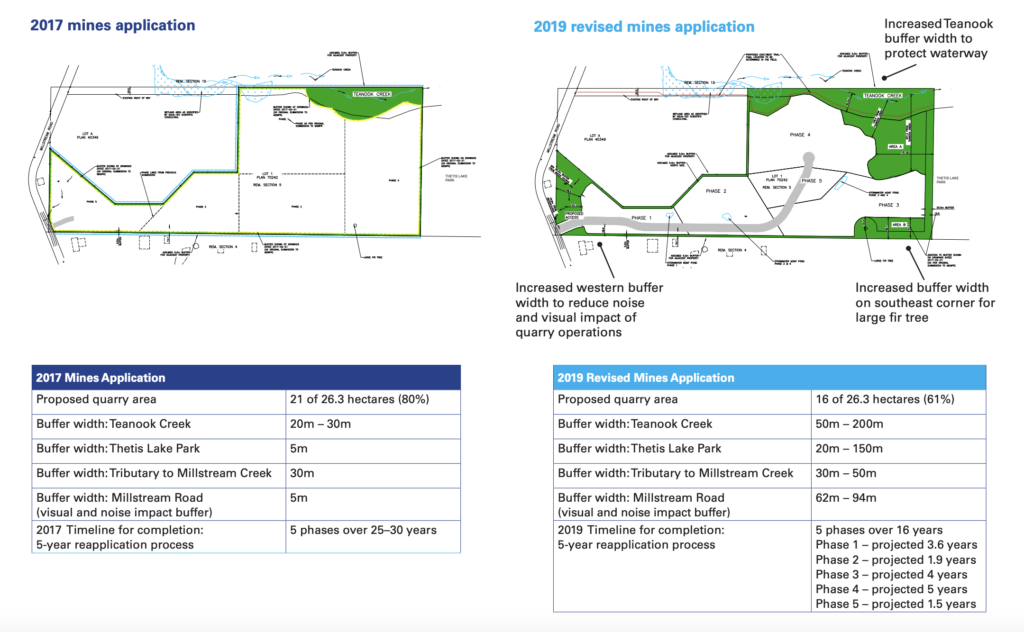
“I am satisfied that OKI can operate the quarry with minimal effects to groundwater quality and quantity for current and future land use in the district,” Harrison says.
Certain parts of the environmental effects and mitigation report are also written into the permit as individual site-specific conditions. These include the management of groundwater, surface water, ecology and wildlife, dust and noise. Stipulations about reclamation and use of the site are in the permit as well. O.K. Industries also has to provide a $75,000 security for reclamation.
Given all of the input and work O.K. Industries did in the permitting process and the many things Harrison took into account, he says he couldn’t deny the permit to the company.
“I find that I cannot reasonably refuse to issue a Mines Act permit for the application based solely on public opposition, without science-based technical evidence that indicates my considerations have left out critical, credible and reliable information and undisputable [sic] facts,” Harrison says.
But in its latest court appearance, the Highlands District Community Association argues that consideration for climate change was, in fact, critical when it came to this site and was left out.
“Most distressing of all is that while the CRD and all its member communities have declared a climate emergency, the Province does not require a rigorous review of climate change impacts,” Richardson said in a statement in November, 2020. “How can we hope to achieve any climate change targets if our provincial government won’t do its part in updating the legislation to fit the need?”
‘Climate change is not relevant under the Mines Act‘
On May 5, 2021, the B.C. Court of Appeal heard arguments from Ian Knapp, a lawyer hired by the Highlands District Community Association, and lawyers hired by O.K. Industries as well as lawyers from the province.
Knapp argued that the statutory decision maker, who acts on behalf of the Ministry of Energy, Mines and Low Carbon Innovation, failed to consider climate change impacts when making a decision about the O.K. Industries rock quarry application. By not doing so, Knapp says the decision to give O.K. Industries a permit under the Mines Act was unreasonable.
In his decision, Harrison writes the impact of carbon emissions related to the O.K. Industries quarry and the impacts on global climate change were raised as issues of concern. But he says these issues aren’t relevant.
“While this is an important issue and Canada has passed a non-binding motion to declare a national climate emergency in Canada, climate change is not relevant under the Mines Act,” Harrison says.
However, Knapp argued in court that climate change is relevant. He pointed out that the area where the mine operation is taking place is considered to be a carbon sink, drawing carbon out of the atmosphere and trapping it.
But the judges at the appeal hearing pushed back. They said there was no evidence provided to the court that directly relates to climate change. There was no impact assessment or anything along those lines that suggest climate change is an important issue to be considered in terms of this quarry.
Knapp argued that climate change itself should be an obvious and significant enough environmental concern, which any development project in the province should consider. He said evidence specific to the case isn’t required to know that climate change is an issue.
“There’s no one cause [for climate change],” Knapp said. “It’s millions and millions of small causes.”
The lawyer representing O.K. Industries, Brian Duong, argued that the statutory decision maker’s finding that climate change is not a relevant factor was reasonable and that “even if climate change is a relevant factor, under the Mines Act it is not a factor that is required to be considered under this statutory scheme.”
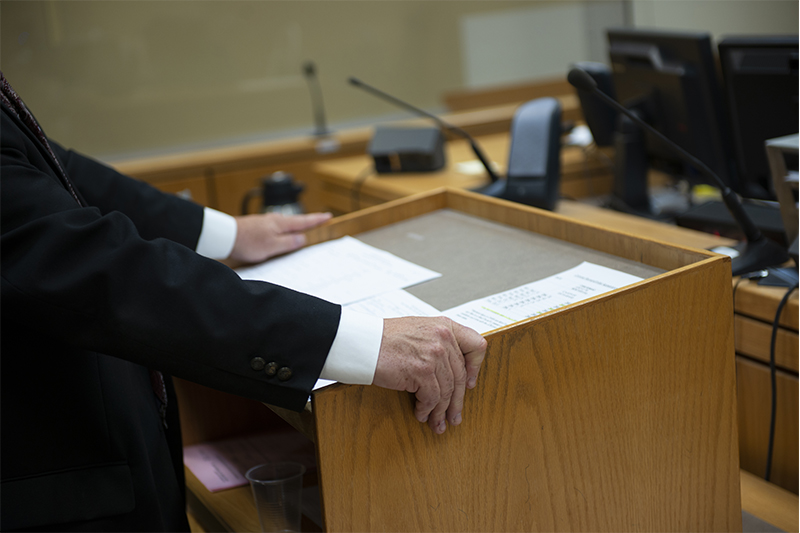
What the Highlands court case could mean
Knapp argued that greenhouse gas emissions, the loss of carbon sinks and other factors impacting climate change should have been considered, as well as commitments to mitigation to balance out those impacts. Those offsets could be attached to the permit as a condition, he said.
“If one wants to disrupt a fish habitat, the Department of Fisheries and Oceans generally requires a no-net loss of fish habitat,” Knapp said, pointing to Canada’s Fisheries Act. A recent modernization of the act promotes rebuilding fish stocks, increased habitat protection and safeguards for fish populations.
In response, Justice G. Bruce Butler asked Knapp if he’s requesting the court impose a scheme requiring every project under mining legislation to undergo a process similar to that in the Fisheries Act.
“Is that something that this court should be doing when the legislation itself doesn’t quite take us there?” Butler asked. “You’re really asking this court to impose a very different kind of regulatory scheme — when you look at all of the statues that are considered in this kind of a project — that isn’t there.”
Knapp replied that he’s not asking the court to impose a new regulatory scheme but to direct that environmental issues like climate change be considered the same way other issues like groundwater impacts were considered by the statutory decision maker.
Justice Butler’s question points to the importance of this case, regardless of the decision that is made.
If the ruling goes in favour of the Highlands District Community Association, it will set a precedent that provincial decision makers must consider climate change and environmental impacts for all operations, regardless of their size.
If the court rules against the community association, it’ll strengthen arguments being made by advocates — such as the BC Mining Law Reform Network — that mining rules need an overhaul. These groups argue that the current laws do not reflect current environmental and social realities. A ruling against the association may help demonstrate this point and build public support for wider law reform.
Advocates want to see mining law reform
Calvin Sandborn is the legal director of the Environmental Law Centre at the University of Victoria and is part of the BC Mining Law Reform Network. He says that at the end of the day, these issues around legislation reform boil down to politics. Especially since the courts can really only act within the legislation of the province.
“It’s all political. It’s how much citizens can convince politicians that it’s in their interest to act,” Sandborn says. “And I think citizens need to argue that we need to clean up the mining industry in order to protect the salmon and protect environmental values. We also need to clean up the mining industry if we want to be a competitive mining-producing province in the 21st century. Because people are going to be looking at what kind of mining is happening, whether it’s environmentally destructive, and whether it respects Indigenous rights.”

The BC Mining Law Reform network isn’t looking to stop mining, according to its website. In fact, it says it recognizes the importance of the mining industry and the need for it to continue. But the network does say it wants to ensure mining practices are more environmentally sound, respect community decisions and consider costs to clean up mining and waste sites. It also wants to see better enforcement of regulations.
A 2016 report from the Auditor General of B.C. says the province is not adequately enforcing its own rules on environmental protection.
The mine ministry says it is already working on improving its rules and enforcement.
A service plan released in April, 2021 from the Ministry of Energy, Mines and Low Carbon Innovation says it plans to review legislation and regulations to “enhance the integrity of environmental, climate, health and safety standards.” It also wants to ensure owners of mining and exploration projects are bonded and responsible for environmental cleanup costs associated with abandoned projects and improve the approvals process for mining applications.
B.C.’s Environmental Management Act also sets out penalties under a polluter pays principle. At the May 5 Court of Appeal hearing, the province’s lawyer noted that O.K. Industries remains subject to other provincial legislation such as the Environmental Management Act, suggesting that existing rules are adequate to ensure environmental protections.
Judgement from the May 5 appeal hearing has been reserved, with no set date for when it will be delivered.
In a separate court challenge, the District of Highlands is appealing a January, 2021 B.C. Supreme Court decision stating that the district’s Official Community Plan and bylaws are not applicable to activities authorized by the quarry permit. [end]
This Delving Into Development article is made possible in part with funding from the Real Estate Foundation of BC and Journalists for Human Rights. Their support does not imply endorsement of or influence over the content.

